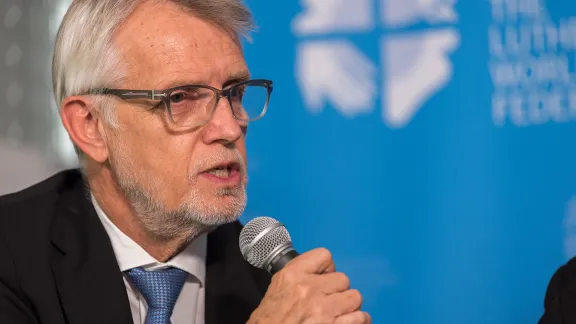
LWF General Secretary, Rev. Dr Martin Junge. Photo: LWF/Albin Hillert
Looking back at one year of the COVID-19 pandemic
One year ago, on 11 March 2020, COVID-19 was declared a pandemic by the World Health Organization.
This was an unprecedented challenge, where people, communities, and churches faced what they had not known before. They had to learn to ensure physical distancing, practice strict hygiene measures, wear masks, learn new ways of living during lockdown.
Physical distancing, lockdowns, and good hygiene kept people safe, but also impacted the income of many, particularly those who could not work from home or those who work for daily wages. The most vulnerable have been disproportionally affected and are struggling daily for their survival.
For many this has been a year of worries – about their own health, about family members and friends who were infected, about their economic situation and their future. For some, worries turned into pain over lives that were lost. Mental health issues are on the rise, with people struggling with anxiety, isolation and grief.
Resilient churches
Churches around the world were profoundly affected. In many countries they had to shift almost overnight to gathering people online rather than in person. Such restrictions were necessary to curb the spread of the pandemic. In other contexts, churches knew the restrictions that should be in place, but waited in vain for authorities to take responsibility and protect citizens by introducing safety protocols.
The resilience of churches has been inspiring. With little time to prepare they adapted services and outreach to online and physically distant ministry. This came with a demanding learning curve and much is still unresolved. Overall, however, nothing deterred churches from offering their ministry and witness to people at a time when there was so much need for the churches’ resolute witness. They have been standing with people and communities as they have dealt with loss and fear, offering pastoral accompaniment.
Through all this, the LWF member churches have continued to be engaged with each other, reaching out to each other, offering mutual solidarity, accompaniment, and prayer. If anything, the communion has grown even closer by standing together during the pandemic. The strong show of support through the LWF’s Rapid Response Fund for COVID-19 has also been a remarkable witness to what it means to be churches in communion.
Signs of hope, yet challenges remain
The COVID-19 pandemic is not yet over. Many countries are still on lockdown, with no end in sight. But there are signs of hope. Vaccinations have begun. In many countries elderly people and frontline workers have been prioritized for vaccinations, for they are among those most vulnerable to COVID-19.
However, the unequal access to vaccines is revealing the deep inequalities in this world, with large sections of the world population deprived from protection through vaccination. It is simply not right that 75% of the vaccine doses have been administered in only 10 countries. Vaccine nationalism is straining international relations and the foundations of people living together in solidarity and justice. This is short-sighted: the virus neither knows nor respects borders.
Plans for a global treaty on pandemics are a good sign, because the challenges of pandemic can only be addressed with multilateral approaches. We must accept this simple fact: until all are safe, no one is safe.
Plans for a global treaty on pandemics are a good sign, because the challenges of pandemic can only be addressed with multilateral approaches. We must accept this simple fact: until all are safe, no one is safe.
The world also needs to come together to ensure that developing countries get the economic support they need to deal with the devastating impact of COVID-19 on basic services like health and education. It will be vital that any such support reaches the most vulnerable and does not come with conditions that end up undermining the long-term recovery of these countries.
“This is a time to continue trusting in God’s compassionate presence among humankind,” I wrote with LWF President Musa, in a letter to LWF member churches in March last year. This deep conviction of faith has been a guiding light through this year of resilience, learning, and hope for churches and people around the world.
And so, grounded in this resilience - God's work among us - we shall continue standing together, nurturing the hope, serving people and communities, as we are called to do.


